“When I asked my dad about his prospects for the company—selling the business, joining with other businesses, selling shares, or becoming public—the first thing he asked me was if I really wanted to be part of the business,” Isidoro says.
His dad, Leo Katz, wasn’t expecting so many questions. “But,” says Isidoro, “it was also reassuring to see how much he wants us to continue with the business and work alongside him.”
Conversations like these, in which family members tackle challenging questions about the family business, underline the goal of Babson’s new Family Amplifier course, part of the College’s Institute for Family Entrepreneurship (IFE).
Started in 2018, almost 100 years after Babson opened with a founding mission to educate the next generation of family business leaders, the IFE launched to better serve the numerous students with family business backgrounds. Among Babson’s undergraduates, approximately one-half hail from families with businesses.
The institute’s latest offering is its Amplifier course, a unique program designed to prepare students for a future role in their family enterprise. Students engage with their families, asking thoughtful, investigative, and sometimes tough questions. The course offers an immersive experience to create a shared business vision that includes the next generation.
Lauri Union, executive director of the IFE, says the Amplifier embodies Babson’s philosophy of creating economic, social, and family value across generations and time. With 70 percent of the global GDP stemming from family businesses, Union believes facilitating conversations about the entrepreneurial legacy of the family is key.
“The homework involves students interviewing their parents, so it is a family experience happening while the students are in school,” she says. “While it is unique, we think it’s essential in terms of families being able to explore their values together and foster their capacity to act entrepreneurially.”
The first student cohort went through a competitive application process. Originally, organizers planned to accept 10 students for the launch, but with 50 compelling submissions from students all around the world, they expanded to 20. Families had to be engaged in an entrepreneurial venture such as a business, a family office, or an investment platform.
The initial group included many international students with family businesses ranging in size from two to 60,000 employees. Some students have worked with their family business in the past, and some haven’t been as directly involved, but all are eager to explore the dynamics of family entrepreneurship with each other and their relatives.
The program includes twice-monthly classes where students discuss family business concepts, engage with guest speakers, and learn about each other’s operations. The homework—exploring the business’s history and potential and talking to involved family members—is what sets the class apart. The process has been eye opening for students.
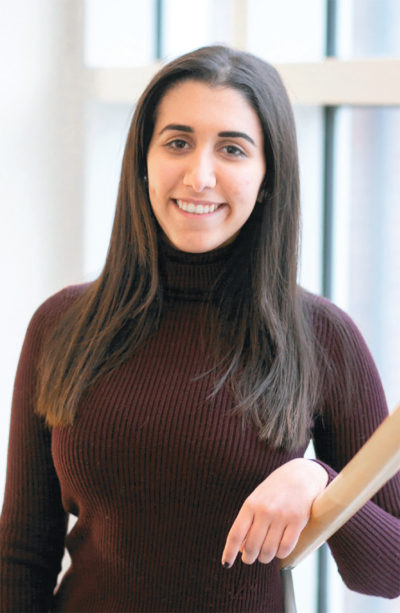
Through the Amplifier program course, Nicole Atala Asfura ’19 connected with her family in a new way.
Fostering Family Dialogue
Nicole Atala Asfura ’19 entered new territory by having these kinds of conversations with her family, which owns a third-generation, Honduras-based financial business, one of the biggest enterprises in the nation and Central America. Helmed by Atala’s father and his four brothers, Grupo Financiero Ficohsa operates in four countries and has several U.S. branches.
Atala, who will graduate in May with a double concentration in strategic management and entrepreneurship, says she was drawn to the Amplifier course. She knew family members’ roles in the business needed further discussion.
“I saw the Amplifier program as an opportunity to provide support on what our goals should be,” she says of the fast-growing company, “and an opportunity to experience this with the insights of other families, alumni, and resources connected to the program.”
Atala admits she found the required discussions with her father and uncle challenging at first, as the men offered only one-word answers without much elaboration. But once she pressed for specifics, she connected with them about the business in a different way. She’s excited to gain knowledge on operations, future projects, and their five-year plan.
Her father, Luis Alberto Atala Faraj, also knew it was important for the family to be in sync on issues of entrepreneurship. He says he benefited by connecting more with his daughter and hearing her point of view. “It makes us reflect on aspects of the family business we need to think more about.”
Strengthening Bonds
Elizabeth Reed ’19 grew up working as part of the third generation of her family business, Storee Construction, an industrial construction company that her mother and two uncles own in Missouri. Under the guidance of her mother, Reed worked in almost every department of the business, including accounting, purchasing, human resources, and project and safety management.
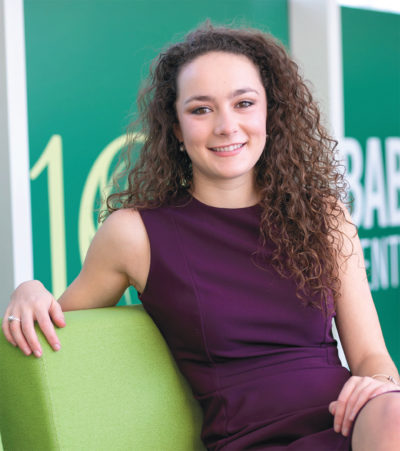
Through conversations with her mother, Elizabeth Reed ’19 knows she’ll be able to shape her role in the future of the family business.
Reed came to Babson to pursue her interest in business as a Center for Women’s Entrepreneurial Leadership Scholar and member of the women’s varsity soccer team. As a senior, Reed was thrilled to be one of the 20 students in the pilot Amplifier course, and she appreciated the chance to have her mother, Amanda Reed, directly involved in her schoolwork and education.
One of the first class projects focused on goals and leadership, and Reed asked several members of her family to create and prioritize a list of life and business goals.
The conversation with her mother included guided questions around her mother’s vision for the company, “her vision of me as her daughter, and the opportunities to be involved in the continued growth of the company as a part of the family business’s third generation,” Reed says.
“Together, we explored the goals my mother had as a business owner and the value she saw in utilizing the capabilities and interests I’ve developed both inside the company and outside, while pursing my management consulting career.”
These conversations also gave Reed the confidence that her family will give her an opportunity to help shape how she is involved in the future of the business.
“Through the Amplifier course, Elizabeth also gained insight into navigating the power dynamics that are inherent to all family businesses,” Amanda Reed says.
Elizabeth Reed always intended to stay involved with the family business, but says the Amplifier course helped her build a more concrete plan for the future. Throughout her four years at Babson that involvement has ramped up; she’s focused on systems integration to help create a new competitive edge for Storee’s project management.
Focusing on Family Interaction
Matt Allen, faculty advisor to the IFE and academic director of the global Successful Transgenerational Entrepreneurship Practices Project at Babson, says he created the Amplifier course based on his experience teaching other family entrepreneurship classes, and worked with other Babson faculty to develop the class. The program will launch in the graduate school this fall.
“According to family theory, relationships and interaction between family members play a key role in how families understand themselves and each other,” Allen says. “More importantly, the quality of interactions can define the ability of families to work together. In typical business education, the family is ignored. Instead, emphasis is placed on content such as operations, finance and marketing—but this content does not prepare students to actually function effectively within the family.”
Students, he adds, are often transitioning from a traditional parent-child relationship into one that will eventually become more professional. “As students study away from home and the family, the relationship does not mature as quickly as the students themselves. The family is learning to readjust and come to a new balance of understanding based on new roles in the family and the business. Thus, the name of the course; we are amplifying the family’s ability to build and grow entrepreneurially.”
The class will eventually cover three years of the undergraduate experience, with the current course, focused on enhancing family relationships, offered to sophomores. As juniors, students will concentrate on improving their understanding of the business and work with their family to discover entrepreneurial opportunities. As seniors, students will work directly with their families to fulfill one of the opportunities defined during their junior year.
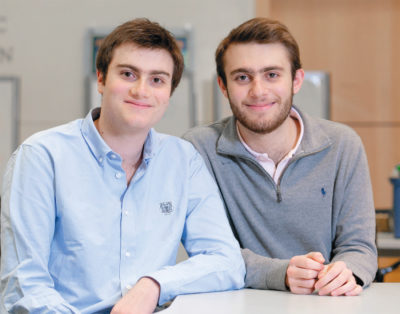
Twins Isidoro (left) and Jonathan Katz ’21 discovered how much their father wanted them to work in the family’s business in Bogota.
Continuing on the Amplifier Journey
Isidoro Katz will continue on the Amplifier path as it evolves. He was born into his Bogota, Colombia, family business, comprised of more than 20 restaurants and food purveyors, mostly under the Zona K brand. Katz’s sister, Michelle, graduated from Babson in 2017, and twin brother Jonathan is currently in the Amplifier program with him.
He appreciates connections he made in the classroom: “I really liked how we could connect with other students and learn what they are doing, how they are similar or different, and what they value the most.”
Before he started the Amplifier course, Katz didn’t know if he wanted to return to Bogota and join the family business immediately after graduation, or follow in his older sister’s footsteps and take some time to work in the U.S. He’s still unsure of his path, but knows he will ultimately work in his family business.
Whatever Katz decides, this course will help him reach his goals by amplifying conversations for the next generation of family entrepreneurs.
Paige Wolf is a freelance writer in Philadelphia.
]]>
Illustration: Martin Elfman
To help guide these families in their endeavors, the IFE is introducing the Family Entrepreneurship Amplifier program this fall. “When you think about amplifying entrepreneurship as it passes from generation to generation, there can be gaps and missed opportunities,” says Union, who successfully managed the turnaround and sale of her own family’s business, Union Corrugating. “Our students often are coming in with a really different perspective from their parents, and their Babson experience is leading them to think about entrepreneurship and themselves in a very different way. When they return to the family business, there can be a gap between the child who left and the person who comes back.”
To close that gap, the program engages students and their families together in coursework focused on family business and entrepreneurship throughout the students’ four years at Babson. Each year, students who are accepted into the program will earn four credits (two for each semester). At least one leader from the family business also will take part. “The family has to want to be involved,” Union says, “by speaking with their child on a regular basis and by being on campus at least once during the year.”
Plans for the course include first asking students to investigate and develop a perspective on the past, present, and future state of their family’s entrepreneurship practice in relation to the business, the family, and the student’s personal goals. Coursework will include interviewing family members and nonrelated employees. “It’s hard to build on something if you don’t know what it is to start or what its value is,” Union says. “This also helps students transition from being a child to talking with managers in the business.”
Parents also need to learn how to work with their children, notes Union. “It’s a little bit of a shift in the relationship, seeing the child as a businessperson,” she says. “The entrepreneurial vision that the older generation has may be different from the student’s. So there’s an opportunity to align those visions. Then the family can best leverage the talents and aspirations of everyone.”
Currently, the program is in a design and test phase, so the initial cohort will include 10 students from a mix of class years, and participants will be asked for feedback. Going forward, there will be grade-specific cohorts, one for each class year, with 40 students eventually involved. Because the cohorts will move through their years together, says Union, they can learn from one another, both students and families. “The best outcome will be for cohorts to develop trusting relationships where they can talk openly with each other,” she says, “and, ideally, carry those relationships out of Babson.”—Donna Coco
To learn more about the Institute for Family Entrepreneurship, visit www.babson.edu/ife.
]]>
A Preventive Approach to Health »
After studying and working in the U.S. for eight years, Chinmoy Mishra, MBA’08, returned home to India in 2012 to address what he calls crucial public-health issues.

Prescribing with Precision »
Kristine Ashcraft, MBA’10, likes to employ the metaphor of a five-highway intersection when describing how Seattle-based YouScript helps deliver precision medicine.

Smooth Operations »
Operating rooms. Cadaver labs. An ever-changing surgery schedule. For Joanna Geisinger, MBA’17, these were part of everyday life as a surgical device representative.

A Way Out of the Dark »
Andres Martin’s cognitive decline “sprung out of nowhere” about five years ago when he was 17, says his older sister, Magala ’17. He gradually went from being a healthy teen to not speaking, not sleeping, and barely moving.
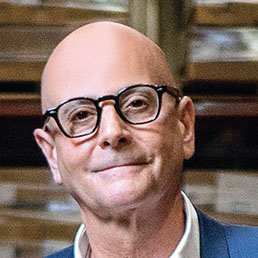
A Lifeline in Times of Trouble »
In 2017, Hurricanes Irma and Maria devastated much of Puerto Rico. Access to basic medical supplies was crucial. During those difficult times, Puerto Rico Hospital Supply, for which Felix Santos ’78, P’16, is CEO, never closed.
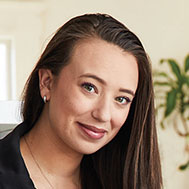
Help with Living a “Normal” Life »
One of the constant challenges of living with a long-term illness, such as Crohn’s disease, diabetes, or cancer, actually has nothing to do with what is happening inside the body, says Emily Levy ’16.
Her younger sister, Tina, often wanted to spend the night in Maja’s room. Maja would let her come in, but only on one condition, that the pair would spend time discussing their plans for the future. So Tina would drag her mattress into the room, and night after night, the sisters talked of ideas and aspirations, of the ventures they would start, of how they would change the world. Maja loved these talks, and so did Tina, even if she was pushed into them by her older sister.
Then at the age of 15, Maja met someone with a similar spirit at her high school. They bonded over a multitude of sports, from skiing to hiking to roller blading, but they also shared something deeper. “What really brought us together was that we liked to dream together,” Maja says. “He was the best person to dream with.”
That person was Mihael Mikek, MBA’06. The two became high school sweethearts and then attended the same college, the University of Ljubljana, located in Slovenia’s charming capital. In each other, they found a partner for adventure, romance, and turning dreams into reality. “Our values, about life and what is worth fighting for, about what is right and wrong, about adventure and dreaming big, that stuff is very much aligned,” says Mihael, who goes by Miha.
Leaving Slovenia, Maja and Miha set off to find what life had in store for them. They came to Babson, settled in Boston, and started a family, not to mention a successful business. That business, Celtra, offers a creative management platform for digital advertising. Miha serves as the company’s CEO and Maja as its CFO. With prescient timing, Celtra was launched in the early days of smartphones and since then has ridden a wave of growth. Two-thirds of Fortune 500 companies, according to Celtra, use mobile ads created with its platform. Last year, Celtra’s platform delivered more than 90 billion ads to mobile internet and apps users.
As they build their business, as well as raise two small children, the Mikeks dash through days that are filled to the brim. But for the two dreamers from a small country, who were hungry to one day “live our own movie,” as Miha puts it, this chock-full life is what they were seeking. “It’s about freedom, independence, doing things on our own terms,” Miha says. “It’s exactly how we wanted to live our lives.”
Spouse and Co-Worker
Celtra’s Boston headquarters is located on Boylston Street, on the 11th floor of a Copley Square office building. Looking out on Back Bay and the Charles River beyond, the office’s windows offer a panoramic view of the couple’s adopted hometown, from Kenmore Square’s Citgo sign to the Zakim Bridge.
On a Monday afternoon at 12:30, Miha darts out of his office, which is simply decorated save for a quote about business strategy and vision written large on the wall. As he makes a beeline for the conference room, he passes Maja’s office, which sits next to his and is filled with pictures of family and friends, and taps on the glass. It’s time for a weekly management meeting, in which the Boston office checks in with Celtra locations around the world. The company has 180-plus employees, with about 70, the bulk of them engineers, stationed in its largest office in Ljubljana, Slovenia. Celtra also has locations in London, New York, San Francisco, Sydney, and Singapore.
In the conference room, Miha and Maja sit directly across from each other. Miha leads the meeting, while Maja chimes in when needed. They speak fast and to the point as leaders from various Celtra offices appear on a large video screen on the wall. “Do we have London on?” asks Miha, who proceeds to run through the numerous deals that Celtra is lining up with large companies looking to improve the effectiveness of their mobile advertising. “Let’s push these things forward,” Miha says.
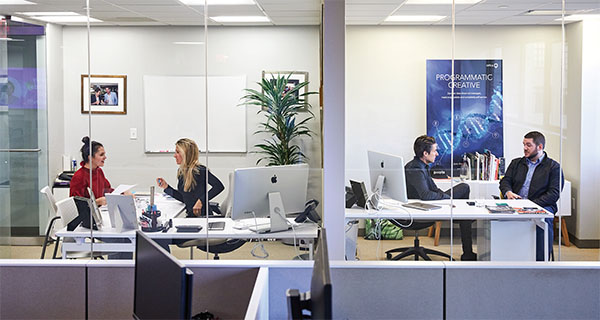
In Celtra’s Boston location, Maja and Miha Mikek have adjoining offices.
Among those sitting in the meeting is Dekyi Lhaze, vice president and controller of Celtra. During her five years at the company, Lhaze has had ample time to witness the Mikeks interacting with each other. For some, the idea of starting a business with a spouse, of having the personal and professional so closely intertwined, would make the challenges of entrepreneurship even more complicated. But Lhaze sees the Mikeks as a steady hand who set a good example for their employees. “They have a very honest relationship,” Lhaze says. “They tell us if we’ve messed up, and they will tell each other if they’ve messed up, even in front of others. It doesn’t matter to them if we’re listening. They are true and honest. They feed off of each other.”
Rodney Alvarez, Celtra’s vice president of talent management, admits to having been curious, and a little concerned, about the dynamics of working for a married couple when he started at the company two years ago. Those concerns proved unfounded. “They are great together,” says Alvarez. “They are a well-synced team. They don’t bring any drama.”
Miha acknowledges that starting a business with a spouse blurs the line between work and home, but that doesn’t bother him. He enjoys sharing his workday with Maja and encourages other entrepreneurial couples to do the same. “This is our life,” he says. “There is no work-life balance. An important part of life is work, another is family. You can’t separate these things. I cannot imagine it otherwise.” In the mornings, Maja and Miha walk to work from their home in the nearby Boston neighborhood of Beacon Hill, and they often bring their children, 6-year-old Sofia and 3-year-old Lev, into the office before school starts. In the evenings, the whole family spends time together, and once the children are asleep, the Mikeks work on the business some more, with night-owl Miha staying up till 2 or 3 a.m.
In the office, the couple bring complementary skill sets. “We are very different in terms of our strengths,” says Miha. Proficient at organizing and connecting with people, Maja focuses on creating a positive culture in the company and tries to get to know every employee. “She takes a holistic look at people,” says Megan St. Ledger, Celtra’s senior legal counsel. “She is interested in people, and I think that is unusual in that role.” Indeed, the CFO has long talked of becoming a social worker one day. “A lot of CFOs look at a company through raw numbers,” Maja says. “I look at it through the people we have.”
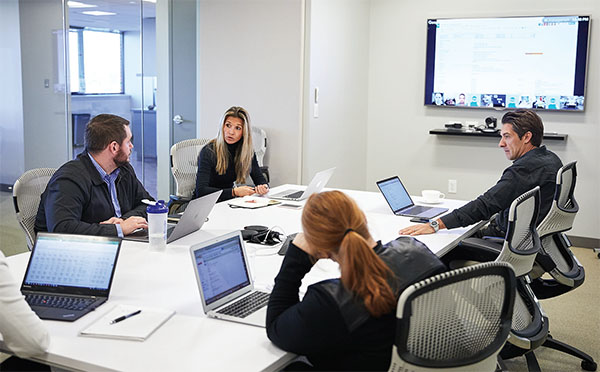
Every Monday, Maja and Miha Mikek meet via video conference call with the company’s multiple locations around the world.
Miha, on the other hand, focuses on pushing Celtra forward. “He demands a lot, challenges everything, and pushes to the limits, many times wanting the impossible,” says Gregor Smrekar, Celtra’s COO. “But then it is OK because he is even harder on himself, and because the goal is big and worthy.” A voracious learner, Miha strives to understand where the ad tech industry is headed and to visualize Celtra’s place in it, says Maja. He always is reading and reaching out to people who can provide insight. He feels no need to be the most knowledgeable person in the room. “He loves to surround himself with smarter people,” says Maja. “He is not ashamed to be the underdog.”
It Felt Right
Miha’s curiosity and interest in tech are ultimately what led the couple to start Celtra in the first place. Mobile phones were set to change the world, and Miha wanted to be part of that. He long has had a knack for identifying trends and business opportunities. In his late teens, during the early days of the internet in Slovenia, he bought 100 domain names and in the ensuing years sold them for a good profit. As a college student, Miha saw how golf had been growing in popularity since Slovenia’s independence brought an increasing Western influence to the country, so he borrowed money from his father and started a golf academy. Miha hired a few professional golfers as instructors and made money offering classes. “There was a certain class of Slovenians hungry for Western things,” Miha says.
In the years prior to coming to Babson, he ran his family’s chemical trading company, becoming CEO after his father died unexpectedly from cancer. Miha admits he wasn’t prepared to be thrust into that position. Lots of on-the-job learning ensued. “I had no clue about that business whatsoever,” he says. “It wasn’t the easiest three years of my life.”
Miha started at Babson in 2005, just after selling the family enterprise to a large public company. He saw the MBA program as a chance to reset his career. At the age of 29, he already had experienced much in the business world, but he was eager for what was next. Maja, the head of marketing at a Slovenian manufacturer of gaming devices, soon followed him to Babson. She was then 26, and she found herself inspired by the College’s can-do, entrepreneurial spirit.

Leaving work for the day, Miha and Maja Mikek walk along Boston’s Commonwealth Avenue toward their home in Beacon Hill.
When the couple came to Babson, the iPhone had yet to be introduced, but Miha already was thinking about the potential of the mobile industry. “I just thought mobile would be a big and super interesting market,” he says. “Phones and networks were getting more and more advanced every year.” Celtra started as a school project and was launched in 2006, though at first the venture’s focus was on offering mobile services such as voice greetings and entertainment content that could be shared peer to peer. But with the iPhone’s arrival in 2007, the couple retooled to center on digital advertising. “Mobile was about to become the most important internet platform,” Miha says. “That changed everything.”
After graduation, the pair settled in the Boston area, which wasn’t the initial plan. “We just thought we were here for school and would be back in Europe in a year or two,” says Miha. But the couple was charmed by Boston. They liked its business environment, its institutions and energy and people. “Boston is great,” says Miha. “It’s full of people with strong opinions who want to make change.” Deciding to stay, Miha and Maja at first worked out of their loft in Cambridge, Massachusetts, before moving the company’s offices to the Cambridge Innovation Center in 2008 and eventually to Boston in 2014.
The company had only three employees in its early years: the Mikeks (who married in 2008) and their co-founder, Matevz Klanjsek, who serves as Celtra’s chief product officer. Ups and downs came and went. “There were days when you wondered whether it would work out, but other days, you felt like you could fly,” says Miha. “Everyone I know who is an entrepreneur, they feel the same.” Young and willing to take a risk, the couple embraced the uncertainty. “It felt right,” Maja says. “If we had to do this now with two kids, I would be way more careful.”
With Klanjsek living in another city, the Mikeks typically were left to themselves. Maja wondered how all that time together, not to mention the stress and intensity of building a business, would affect their relationship. “I never thought it would turn out so productive and joyful,” she says. “It bettered our relationship. We were in it together. The stress, it brought us closer and closer. I definitely think it did a lot of good for us.” Given the challenges they were up against, they didn’t waste time on petty arguments. “It was just the two of us,” Maja says.
The Best Years

Miha and Maja Mikek with their children, Lev (with Maja) and Sofia (right), at the Frog Pond ice rink in Boston Common.
Celtra took time to find its footing. In 2009, the company received $1.2 million in seed funding, but Maja says Celtra didn’t truly take off until the fourth quarter of 2010, when it experienced a surge in revenue. “It felt like we had some wind in our wings,” she says. Series A funding of $5 million followed in 2011—“I did a screen shot of the account that day,” Maja says—and Series B and C funding came next in 2013 and 2017, respectively. Miha’s ultimate goal for Celtra is a big one, to essentially make advertising better by elevating the quality of the message. He believes that rapid changes in technology and the way consumers absorb content make advertising challenging for companies, but he feels Celtra can help companies greatly improve their creative.
As Celtra thrives, controller Dekyi Lhaze marvels at how the Mikeks have continued to develop as leaders. A dozen years after founding Celtra during their Babson days, they remain passionate and committed. “I think there is remarkable growth in both of them. They push themselves very hard,” Lhaze says. “I have been a strong believer in this company because of them.”
With all their success, the Mikeks haven’t forgotten the small, beautiful country where they were raised and first met as teenagers. They return to Slovenia frequently for work and personal reasons. They also bring all Celtra employees to the country for a company-wide meeting every year. “I still call Slovenia home,” Miha says.
In Slovenia, the pair dreamed up a life together, and leaving the country ultimately set them off on an entrepreneurial journey with Celtra. It’s a path the Mikeks are grateful to have taken by each other’s side. “It’s really been an experience,” says Miha. “When I look back, it was the best 12 years of my life.”
]]>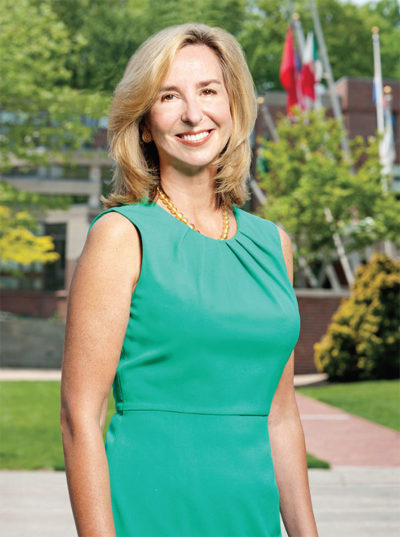
Photo: Webb Chappell
Babson President Kerry Healy
Many of the discussions at BCW focused on priorities identified in our Centennial strategy: family enterprise, women-led entrepreneurship, and social impact. Ramon Mendiola ’86, P’20, CEO of Florida Ice and Farm Co. and a newly appointed Babson trustee, led a lively discussion on the triple bottom line—people, planet, and profits. At Babson, social, economic, and environmental responsibility and sustainability are central to our curriculum. Ramon’s reflections reinforced the importance of preparing entrepreneurs to lead in a new way, creating social and economic value simultaneously.
We also were honored to induct Harry Susilo, P’96, chairman of Sekar Group, into Babson’s Academy of Distinguished Entrepreneurs. We heard from Harry and his daughter, Finna Huang ’96, about the extraordinary 50-year journey of the Sekar Group, which began as a small fishing operation in a poor rural village and has transformed into an international enterprise employing 20,000 people. Their insights into the opportunities and challenges associated with a large family enterprise further emphasized the critical role of Entrepreneurial Thought & Action in shaping successful family businesses.
The weekend ended with a beautiful reception and awards gala, during which Roshni Nadar Malhotra, executive director and CEO of HCL Corp., was presented with the 2017 Lewis Institute Community Changemaker Award. Both Roshni and her husband, Shikhar Malhotra ’04, are accomplished business leaders, passionate philanthropists, and trustees of the Shiv Nadar Foundation. They have been instrumental in the foundation’s mission to create educational opportunities and empower individuals to bridge socioeconomic divides. Roshni is the driving force behind VidyaGyan, a leadership academy for exemplary, underprivileged students from rural India. VidyaGyan nurtures future leaders who can act as catalysts for change, setting in motion a ripple effect of transformative social impact.
Babson Connect: Worldwide is one of the many ways in which we celebrate our global community and bring Babson to the world. Planning is already underway for our 2018 event. I hope you will join us next year in Madrid as we continue to innovate, collaborate, and explore the potential of entrepreneurs to change the world for the better.

Kerry Healy
]]>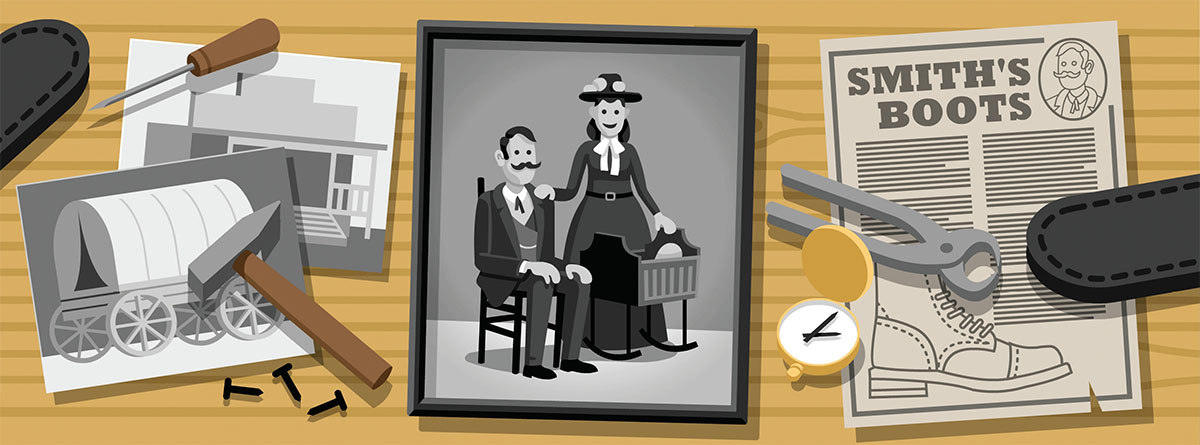
Diego Lowenstein ’90, CEO, is the third generation to work at Lionstone Development. Founded in 1966 and headquartered in Miami, Lionstone is an international developer of residential and hospitality ventures.
There is no magic formula for grooming the next generation, but make it a point to expose young children, even at the ages of 5 or 6, to the business. As they grow, involve them more by bringing them to the office, having them participate in meetings with other executives, and giving them summer internships (paid and otherwise). Also expose them to the business sector in a larger way, such as taking them to industry trade meetings, seminars, conventions, and on visits with competitors.
When they are in the university period of their lives (and, let’s hope, have chosen to go to Babson) and have demonstrated a passion to come into the family business, challenge them to keep up with the sector while in school and ask them to participate in decision-making activities that will mean something to them, such as longer-term planning. Have them take internships in similar companies and work for a competitor or in a similar field for a few years after graduating to understand “how things get done elsewhere.” But above all, find out if your young adult children truly have a passion for the business. If not, it is always better to let them go out on their own and find happiness with what they believe in.
Cyril Camus ’91, president, is the fifth generation to run the House of Camus. Founded in 1863 and headquartered in Cognac, France, Camus is an international producer of high-end cognacs and a distributor of wines and spirits.
Passing on the business is mostly a matter of passing on its core values and a sense of entrepreneurship. Concentrate on those, as all else ends up being mostly irrelevant.
Bob Paisner, MBA’85, CEO, is the second generation to work at ScrubaDub. Founded in 1966 and headquartered in Natick, Massachusetts, the car wash and service provider has 18 locations.
The current owners must believe that they are the stewards of their family enterprises, as these businesses—we hope—will pass from one generation to the next. Too many owners get an “offer too good to refuse” and sell out. While this may seem like a great deal, in the long run it may not be; if the business has a viable future and there are possible family members to take over, the greater opportunity for the next generation and the family’s wealth may be in not selling.
Taking on the role of stewards, owners must make decisions with a goal of transition rather than of sale in mind. The focus should be around constant communication of both business and family values. These values create a family business culture that is critical to continue through the younger generations. Clearly defined roles for family members and regular family meetings to discuss business and family issues also are very important.
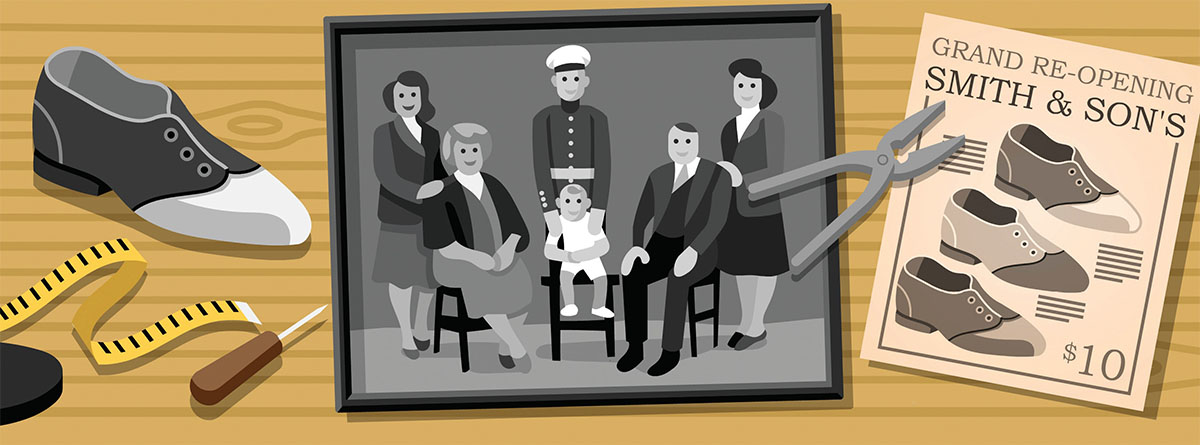
Mathew Paisner, MBA’12, director of business development, is the third generation (Bob is his uncle) to work at ScrubaDub.
When I was growing up, my grandfather told me stories at the dinner table about situations he encountered in the family business. I learned about ethics, leadership, and customer service. However, the most important lesson he taught me was how valuable and meaningful it is for family business leaders to think about creating an opportunity for the next generation, as opposed to leaving behind a large sum of money. This requires creating a culture that mutually reinforces family and business values.
So the best advice I can give to others being groomed to join their family businesses is to ensure expectations are aligned among all family members on defining those family and business values. These values should be discussed and documented in writing. They should define roles, responsibilities, and expectations so that no family member feels like there is a question about how he or she fits in or about the future vision for the family business. Too often, family businesses avoid these conversations and assume everyone is on the same page. The next generation needs to embrace this value system while managing new views, so that ultimately everyone achieves a shared vision.
Sheri Baraw Smith, MBA’92, vice president and general manager, is the third generation to work at Stoweflake Mountain Resort & Spa. Founded in 1963 and located in Stowe, Vermont, the year-round resort offers upscale accommodations and amenities, as well as a range of on- and off-site activities.
I’ve talked to many people in family businesses, and there often is drama when people enter or leave the business. We’ve worked very hard to avoid that. My grandfather’s belief was that you made sure your family members are OK, but you don’t allow them to come in just because they are family. It’s more, ‘Here’s the opportunity, this is what the commitment would be, and this is the required skill set.’
I always knew I wanted to be in our family business. But when I graduated from college, I was 21 years old, and my dad said I could not yet work for the resort. Our family believes you have to have experience elsewhere, which will help you be more prepared and committed. Also, the right role needs to be open.
Years later, when the resort’s assistant general manager decided to move on, my father asked if I was ready to move back. So I came, and as part of the process I actually interviewed my father, asking him what the position would be. Even if you know you want to join the business, you need to think about the role you’ll be taking and whether you can work with the family members in the business. I knew I would be reporting directly to my father, and there are pros and cons to that. I also would be taking a management role and becoming the boss of some managers who had been there for a very long time. I had to consider what that would mean.
Our plan for transitioning the next generation, including my children, nieces, and nephews, is to follow the same steps as when my generation came on board. First, get experience elsewhere, whether in the hotel industry or not. The skill sets are often transferable. We are not a large business, so the fresh look you bring is really important. A position also has to be open. So far my son, who is 15, is the only one who has shown an interest in joining the business. He has a warm, welcoming personality and is very good at socializing with guests. If he decides to come in some day, the path he takes will depend on attrition.

Evie Merrill, MBA’15, senior marketing manager, is the fourth generation to work at Bartell Drugs. Founded in 1890 and headquartered in Seattle, the drugstore chain has 65 stores in the Puget Sound region.
It’s OK to wait to enter your family business and get some experience elsewhere first. You’ll be able to fall back on your previous accomplishments, which will build credibility among your work associates within your family business.
Also, I think I’ve built trust within our business by making sure I’m humble, approachable, and accountable for my actions. Through these practices, I’ve been able to push through some of the negative assumptions—such as entitlement, laziness, and an inability to receive feedback—that people can make about a family member entering their own business.
Paul Iantosca ’74, P’00, is the founder, owner, and principal of the Arborview Cos., a realty, property management, and restoration firm founded in 1980 and headquartered in Jamaica Plain, Massachusetts.
When I was a child, I envisioned buying and running my father’s company after college. As a result, from an early age I studied how he managed his company, how he treated people, how he grew the business, and how people reacted to his style. I learned that employees do not respect an owner’s child who just comes in and assumes the head of operations. The respect from workers comes when a younger member of the family starts at the bottom and works up through the ranks. By taking this route, they see what other employees have to deal with and how they handle various functions.
In the end, I founded my own business. I’ve taken my three children to my job sites, to my clients’ homes, and to my offices since they were 5 and 6 years old. I wanted them to learn to be comfortable in these settings. My children were on site while I talked with contractors and building inspectors, and they became familiar with what we do and how we operate. That familiarity and knowledge may lead a child to want to work in a career that is similar to their parents’.
Fortunately for me, I went to Babson, and we studied the dynamics of family businesses. From classes and personal experience, I can share the following advice. Younger family members should work in various divisions within the company before taking a management position. Company leaders need to realize that the younger generation will do things differently, from designing new programs to adjusting operations to introducing new technology. While allowing thoughtful execution of new ideas, leaders should work with the younger generation to monitor results before making new ideas permanent practices. Personally, I knew I wasn’t going to agree with everything my son wanted to do. But I felt that if I had not listened to him and tried his ideas, he would have become frustrated. So as a leader, you have to learn to turn the reins over slowly and give children some latitude.
Not only did my oldest son, Christian, join the company, but my second son and daughter also joined. They all are on a pay structure that is tied to the performance of their divisions. They have their own divisions, but they work together, helping each other continuously. Five years have passed since they’ve all been on board, and the company is extremely successful.

Christian Iantosca ’00, Realtor and certified residential specialist, is the second generation to work at Arborview Realty, part of the Arborview Cos.
My advice to others being groomed to become a part of a family business is to soak up all the knowledge of the mentor and gain a meaningful understanding of the business before taking a leadership role. When I started, for example, my father made sure that I worked directly with people at all levels of the company so I could understand their roles and the challenges they face. Gaining this knowledge has helped me shape the company in future years. On the client side, my father’s way of doing things—in a very personal, face-to-face manner—was different from mine. However, I forced myself to do things exactly as he instructed, even though this often felt uncomfortable, in order to learn different ways to approach clients. In my first few years, I was interacting with my father’s longtime clients, so they expected me to do business like him.
I also would not try to make any changes for the first year or two. Instead, learn what the clients value about the existing business, and why they choose to do business with your company. Eventually, I shifted the focus of the business and targeted younger, more tech-savvy clients, which has been critical to our continued success. The long-term relationships established by my father got our business to the top, but his clients were phasing out, and I knew we needed to change the focus to stay successful. However, if I had tried to make this pivot too early, I would have missed grasping the core reasons why the business had been so successful in the past.
When proposing changes to the business, get your parents and other involved family members to buy in to your ideas. Change comes slowly when two generations are working together, so be patient and share your vision way in advance of when you hope to make the change. Look for examples that can illustrate why the new way will work, and keep pushing for it. Eventually, you will earn the respect of the older generation, and they will see that you are successful and trust you to take the helm. But don’t assume that being a family member will make it less arduous to convince the management team of the merit of your proposed changes.
Eshika Agarwal ’19 is a current student who hopes to join her family’s business, Jaydurga Furnishings, founded in 1999, and Jaydurga Decor, founded in 2013, both headquartered in Hyderabad, India. Jaydurga Furnishings is a retail outlet for furnishing products, such as curtains, carpets, linens, and wallpaper, and Jaydurga Decor distributes curtains and upholstery fabrics.
I strongly believe that shared leadership between the older and newer generations will lead to higher levels of success. The newer generations must learn from the experiences of their elders and understand the struggles that these previous generations have faced in building the organization to its current level of success. However, I think it is even more important for the older generations to step back and allow the younger generations to solve problems on their own and make mistakes. Perhaps the younger family members could handle a different aspect or line of the business; this would allow them to obtain a sense of independence and provide them with a platform to explore new, innovative ideas. A perfect synergy will exist when all generations value and truly respect each other, personally and professionally.
]]>Art and John, both ’84, are the third-generation owners of Joseph’s Garage, a Norwell, Massachusetts, institution started in 1928 by their grandfather and then run by their father and uncle. The brothers have worked at the garage for nearly their entire lives. John began when he was 15, around the time he took apart and rebuilt a 1967 Pontiac Firebird, his first car. Art started at the age of 9. One Saturday morning, he was about to settle in to watch TV when he noticed two lunch bags sitting on the table, instead of the usual one for his father. “The next thing I knew I was here,” he says.
With their long, shared histories, the brothers are typically in sync on business concerns and can anticipate what the other might say. “We have the same background, the same set of friends, the same teachers,” says Art, who is two years older than his brother. “It’s almost like we’re the same person. We’re exactly of one mind.” Even if a decision proves difficult, they rarely have disagreements. They silently weigh the pros and cons and know what needs to be done. “We’ve already had the argument in our mind,” says John. “We just give each other a look.”
Such is the ease and familiarity that can happen when working with a brother or sister. Yes, personalities and skills may not always mesh, and mixing family in matters of business may be tricky. But to go into business with a sibling is to partner with someone whose connection to you runs deep. When it jibes, there is trust. And respect. And love. “I like working with my brother,” Art says. “We’ve spent so much time together. There is nothing worth fighting over.”
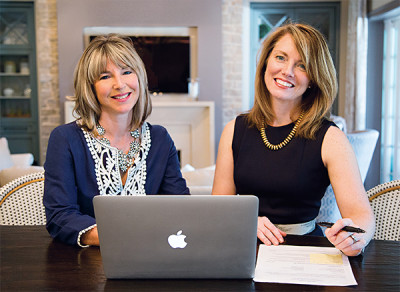
Photo: Peter Taylor
Sue Cooke ’87 (left) and Joanne Verkuilen ’92 of Circle + Bloom in Charlotte, North Carolina
The Sisters in Charlotte
When Sue Cooke ’87 considered joining the startup of her sister, Joanne Verkuilen ’92, the two had serious conversations about how that partnership would play out. “There was a bit of concern at first,” says Joanne. “You hear these adages about how you don’t go into business with family or friends.”
The sisters didn’t want to harm their relationship, which has grown warm and close in their adult years. As children, they were more distant. Five years apart in age, they have the same father, but different mothers, and so were raised in separate households. The two would see each other, but they didn’t have much of a connection. Then as adults in their 20s, Sue decided to invite Joanne, who had just graduated from Babson, to tag along on a business trip she was taking to Europe. The two traveled to London and Paris and other parts of France, along the way realizing they had much in common. “It was great,” Sue says. “That was the first true one-on-one bonding we had.”
Nowadays, the sisters’ lives are intertwined. They both live in the Charlotte, North Carolina, area, a mere 10 minutes from each other. They vacation and celebrate birthdays together, and they have children the same age. They also are linked by Circle + Bloom, their women’s health venture, the roots of which began with Joanne’s attempts to become pregnant with her second child. As someone with polycystic ovarian syndrome, a hormonal imbalance that can make conception difficult, Joanne went through two miscarriages and about two years of trying before finally giving birth. That struggle took a toll, as it does for many women. “It is one of the most stressful, difficult times in a woman’s life,” Joanne says. “It shakes your whole foundation of what you wanted for your life.”
Joanne has long been interested in the connection between the mind and body, but she was too drained and distracted to investigate how that link might help her when she was trying to become pregnant. Later when a close friend also had difficulty conceiving, however, Joanne made her a simple meditation program to help alleviate stress and visualize what was going on in her body. The grateful friend found the program re-energizing and relaxing and eventually gave birth. Soon after, Joanne was standing in her kitchen one morning, drinking coffee while staring out at her backyard, when she had an epiphany. What if she created a more substantial program for other women struggling to get pregnant, she thought, one that corresponded to each day of a woman’s menstrual cycle?
Having spent a career in finance, Joanne was looking for a change and wondered about the business potential of her idea. As she conducted research, she talked frequently with Sue. “She would run things by me,” Sue says. “I thought it was a great business idea.” But months passed, and while Joanne was working on Circle + Bloom, she still hadn’t committed fully to launching it as a business. Sue finally told her: “I think you’re at the point where you’re either going to do something or not.”
Sue set up a meeting for Joanne and herself with an investor she knew, Jerry Greenberg. He liked the business and wanted to invest, except for one catch. He turned to Sue. “If I’m going to put money into it, I want you involved,” Greenberg said. “I don’t know her.” The sisters saw the sense in the request. Sue had the time to devote to Circle + Bloom, and, in a career spent as an executive and consultant, she had gained a lot of experience growing companies.
But mixing business and family was a concern, so the sisters had honest talks about how their strengths and weaknesses would match up, how responsibilities would be divided, and how they would deal with disagreements and difficult times. “You really need to have the tough conversations up front,” Sue says. “You need to think about the potential conflicts before they come your way.”
In the end, they decided to go for it. “We felt confident that this wasn’t something that would hurt our relationship as sisters,” Sue says. “And it hasn’t. It’s been great.” Circle + Bloom launched in 2008. Joanne handles product development, which involves consulting with doctors and recording the meditations that she writes, while Sue looks over the financials. In case of strong disagreements, the sisters decided early on that their investor, Greenberg, would serve as the tiebreaker, though such a thorny situation has never come up.
In the beginning, Circle + Bloom faced slow growth, but word of mouth has fueled a recent surge in business. Beyond fertility, the company also has added programs that address restless sleep, cancer treatment, and other issues. “We’re hitting some of our best months,” Joanne says. “It’s taken some time, but it’s really growing now.”
The sisters hear from many women who believe the company’s offerings have helped them. “I get emails every day, people thanking us,” Joanne says. “We get incredible success stories. It’s really rewarding.” Adds Sue, “It’s very inspirational. I have lots of respect for Joanne. She’s the one who came up with this. Her creativity is just amazing.”
For her part, Joanne is happy to have a partner along for the ride. “Having to be on your own can be really tough,” she says. “You have no one to share the hurdles with, to talk with, to strategize with.” The fact that her partner is her sister is a bonus. “She is a friend,” she says. “I respect her so highly. There is a huge amount of trust. The entrepreneurial path is arduous and filled with excitement, but to share that with a family member, it is very rewarding.”
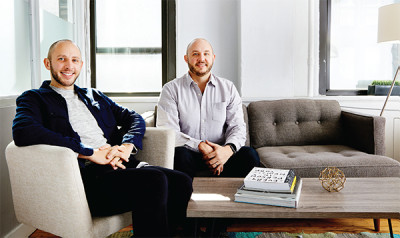
Photo: Eric Medsker
David ’05 (left) and Andrew Heath, MBA’12, of Bombas in New York City
The Bombas Brothers
Growing up, Andrew and David Heath, the brothers behind the successful New York City-based Bombas sock company, spent a lot of time outside. They climbed trees, rode bikes, and played in a stream that ran through their backyard. They got on each other’s nerves a bit, admits Andrew, but that eased up over time. By high school and college, the brothers talked about going into business together. They realized they had different but complementary skillsets. “I’m very logic based. I’m a finance guy,” says big brother Andrew, MBA’12, who is three years older than his sibling. “David is extremely outgoing. He’s a salesperson through and through. He’s got the ability to talk to anyone about anything.”
The brothers were raised in a house that prepared them well for entrepreneurship. As kids, they watched their father grow his company, which provides wood-chip surfacing for playgrounds, from a startup in the family garage to a large, successful firm with customers across the country. “We watched my dad’s business grow from nothing to something,” says David ’05. Seeing the entrepreneurial spirit up close left an impression on the brothers. “We saw our father’s life as something fun and wanted to emulate it,” says Andrew.
The brothers also credit their father and mother, who was a banker and financial planner, for instilling in each of them the same solid values for doing business. “They have a do-the-right-thing mentality,” says Andrew. “You don’t need to grow the business at the expense of someone else.” The brothers treat colleagues, and especially each other, with respect. “At the end of the day, my brother is my brother,” says David. “I don’t want to screw over my brother. My brother isn’t going anywhere.”
The brothers’ first venture together was a New York City-based truffle company, which they launched with their father and another partner in 2012. The brothers worked well together, and the company was profitable. But then the partner announced that he wanted to buy out their half of the business and take over sole ownership. The brothers decided to relent, and they and the elder Heath sold their share in early 2015. By then, though, the brothers had another venture percolating: Bombas.
David found the inspiration for Bombas, which donates one pair of socks to someone in need for every pair it sells, when he read a quote from the Salvation Army saying that the most needed clothing item at homeless shelters is socks. Wanting to build a business that creates social good, David researched Bombas in 2011 and 2012. Andrew thought the venture was promising and soon wanted to be a part of it. “If you’re interested in pursuing it, then bring me along,” Andrew told David, who knew he would need someone reliable to handle the company’s financials. Andrew eventually joined Bombas in 2013, the same year it launched its first product. To date, the company has donated more than 900,000 pairs of socks, and it works with charities across all 50 states. Last year Bombas earned $4.6 million in revenue. “We’re doing phenomenally,” Andrew says.
David serves as Bombas’ CEO, and although he strives to run the company democratically, times arise when he must overrule others, even his brother. But Andrew understands. “Someone needs to have the final say ultimately,” says Andrew, the company’s COO and CFO. “When a hard decision needs to be made, he’ll stick his neck out and make the call.”
In the company dynamic, analytical Andrew often plays the role of devil’s advocate, serving as an important gut check to his brother’s positivity. “It’s a good mix,” Andrew says. “David is an eternal optimist. You have to be as CEO. When you are an eternal optimist, you constantly assume things will work out. I’m a little more grounded. I’m not negative, but I’m grounded. I do have doubts.”
To be brothers and business partners means spending much time together. In the office, Andrew’s and David’s desks are within arm’s reach of each other. Outside the office, they take ski and snowboard trips together, and they even live in the same building, their apartments located one above the other. When they hang out, the business is a frequent topic of conversation. “It gets annoying to others,” David says.
Despite living such interconnected lives, the two don’t feel as if they need a break from all the brotherly togetherness. “We are not sick of each other at all,” Andrew says. “It’s a lot of fun.”
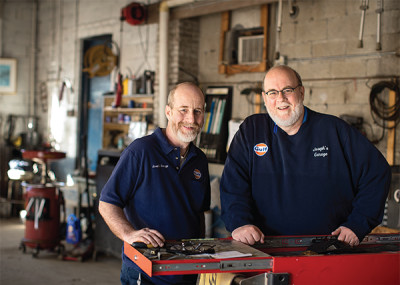
Photo: Tom Kates
John (left) and Art Joseph at their family’s garage, which their grandfather started in 1928
The Brothers in the Garage
For a brief time, Art and John Joseph flirted with the idea of not going into the family business. As a senior at Babson, Art bought a nice suit and went to a bunch of interviews. John took a part-time market research gig for a while. But neither took his pursuit seriously. To work with cars side by side with their family was what they wanted to do. “I think we ultimately knew where we would end up, and it would be OK,” Art says.
Joseph’s is as much a business as it is a living piece of their family history. In the cluttered service area sits their dad’s toolbox, Uncle Phil’s toolbox, and a host of cans, boxes, and parts that look as if they were put down years ago and haven’t moved since. “Everything is exactly where we put it, whether that’s this week or 40 years ago,” John says. Art’s office used to be his grandfather’s, and not much has changed. “I’m sitting here looking at the same paneling,” Art says. “It’s harder to change things in a family business because you know the guy who put it there.”
John manages the service area. Just as his Uncle Phil did before him, he oversees the gas pumps and the brake jobs, oil changes, and repair work. “I like working on cars,” he says. “It’s all problem solving.” Art, meanwhile, serves as office manager. Just as his father did, he keeps the books and also sells cars. For decades, Joseph’s was a Pontiac dealership, but then the marque was discontinued in 2010, so the garage now sells used vehicles. Joseph’s loyal customers helped the garage weather the loss of the iconic brand. “We still have some of the same customers who were coming in here when I started,” Art says.
Joseph’s is open six days a week, though it closes a bit early on Saturdays, a tradition started in the 1960s so workers could attend 5 p.m. church services in nearby Scituate. The brothers rarely take a day off. “How do I take a day off?” asks John. “You have to burden someone else.” John believes this is actually the biggest challenge of working in a family business. If you take off at IBM, Microsoft, or some other large corporation, the business simply goes on without you. But if he takes a day off at the garage, he knows his brother and the other workers in the small shop will have to cover for him. “The work doesn’t disappear,” he says.
While Art and John run the garage’s day-to-day operations, they also have three younger brothers, Henry, Herb, and Edward, who cycle through from time to time, helping with towing, pumping gas, and miscellaneous projects. All five brothers began working at Joseph’s as kids, and, as is the custom, pumped gas before moving on to other jobs. Art, who learned to drive by the age of 9 or 10, would help drop off cars with his dad. While his father drove a customer’s car, Art followed behind, driving his dad’s Pontiac. This one day caught the attention of the local police. “The first time I was pulled over I was 12 or 13,” Art admits. The officers told him: “We know you’re a good driver. Just stop waving at us.”
Two nephews currently work at the garage, both of whom also started out by pumping gas. In all, the five brothers have 10 children, but they’re all under the age of 22, so Art is unsure who may ultimately enter the family business. “We’re still in the early innings,” he says.
Until a new generation is ready to take over, Art and John feel a responsibility to keep Joseph’s alive and well. “It’s a stewardship,” Art says. John doesn’t see that responsibility diminishing. “There’s no retirement. There’s no ending,” he says.Sitting in the old office of his grandfather, whose picture hangs on the wall, Art feels firsthand this responsibility as he works on the garage’s payroll. He lingers on the names listed, his and John’s and their other brothers and nephews. To see them all there together gives him great pride. “You look down the payroll,” he says, “it’s cool.”
]]>But when the financial world collapsed in 2008, MMC Energy went with it. Gagnon worked for a while for an investment bank and ran his own consulting business, but by 2012 he chose to step away from the drama of private equity. His new focus: improving how people dry their hands in public restrooms. Gagnon joined his parents and brother in the family business, Excel Dryer, in East Longmeadow, Massachusetts.
Talk of Gagnon someday joining the family business wasn’t new. Gagnon just hadn’t been sure about changing the direction of his career, in part because it meant shifting away from CFO roles to a position focused mainly on sales. The switch also meant that his wife, who had lived most of her life in New York City, and daughter would need to move from Manhattan to a sleepy locale in western Massachusetts. Gagnon discussed with his father and brother ways that his skills could help the company. “There was a lot I could bring to the table,” he says, including his international experience. So he agreed to start with a part-time, one-year trial period.
Despite reservations, Gagnon was intrigued by the chance to work at Excel Dryer. In his previous work in accounting and private equity firms, he had focused largely on middle-market companies like Excel, but the companies were often in financial trouble. This made him appreciate Excel’s success and its lean business model. His father, Denis Sr., had purchased Excel Dryer in 1997 and invested in research and development to build a better hand dryer. Around 2002, the company introduced the Xlerator, reportedly the first hand dryer to use a proprietary technology to generate a high-speed, focused air stream that reduces drying time to 10 to 15 seconds.
The company lacked the flash of mergers and acquisitions, but Gagnon says he also felt motivated to contribute to his parents’ and brother’s success. “Knowing that you’re doing all of this for your family’s business makes a big difference,” he says. When the trial year was up, he chose to join Excel full time, with plans to run the business with his brother and assume the CFO role when his father eventually retires.
For now Gagnon’s main task is growing and managing Excel Dryer’s overseas presence; just 20 percent of its current business comes from outside the U.S. The strength of the dollar against foreign currencies makes this a difficult moment to break into these markets, Gagnon says. He also has no direct sales staff based overseas. His strategy is to find the right independent distributors: people interested in selling Excel Dryers who are choosy about the products they distribute and who know their local markets inside and out. Gagnon knows the range of hand dryers found in the U.S., but knowing every competitor in a foreign country is tougher, so he needs distributors to provide these details. “They become our eyes and ears and our voice, and handle business on the ground for us,” he says.
In Brazil, for example, Gagnon is working with a new distributor who labored to cut through red tape to start selling Excel’s products. “Growing this business internationally is a phenomenal challenge,” Gagnon says. “If we can land that key Brazilian distributor, work out all the details with him, and ship that first order to him, it provides the same sense of accomplishment that comes from closing a major deal.”
Looking ahead, Gagnon suspects that Excel may someday consider acquiring other complementary businesses, a task he is well-equipped to tackle. But that remains an option for the future. “The challenge right now, and it’s plenty interesting, is continuing to grow, especially internationally,” he says. “We’ve got plenty to focus on.”
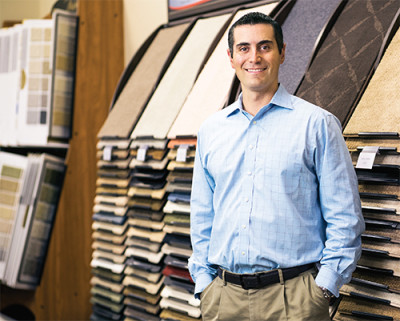
A.J. Boyajian, MBA’09, co-owner, A.J. Rose Carpets & Flooring
A Chance to Grow
When A.J. Boyajian, MBA’09, graduated from college in 2002, he spent his first year working as an accountant for a mutual fund company in Boston. In 1977, his parents had founded a flooring company in the Boston suburbs, A.J. Rose Carpets & Flooring (named for his father, A.J. Sr., and mother, Rose Ann), and, growing up, Boyajian had wondered if he would someday join its ranks. But first he wanted an outside perspective and experience.
Still, Boyajian spent that year in mutual funds feeling increasingly drawn to his parents’ company, in which he saw a lot of potential. “It was a chance to grow the company into something special, and I was incredibly excited,” he says. So in 2003 he came on board and has worked there since. “Family businesses have a million challenges,” he adds, “but one of the plusses is the passion and the caring and the work you want to put into it.”
Today Boyajian and his older brother, John, co-own the company. Their father retired more than a decade ago, although their mother continues to help part time with various management tasks such as bookkeeping. In addition to finance, accounting, and marketing, Boyajian handles the retail business, which makes up about 50 percent of sales. The company currently owns three retail stores in the Boston area, and Boyajian oversees the merchandizing decisions, such as pricing and which products to include in the showrooms. His brother runs the commercial division, which supplies flooring to businesses, including real estate developers and universities.
In the last seven years, A.J. Rose has nearly tripled in size, says Boyajian. “Business is incredibly good,” he says. “Each month is like the best month we’ve ever had, so right now we have growing pains in terms of trying to maintain our quality as we grow.” His biggest challenge is staffing, which includes determining the right number of employees to hire, training them to ensure their skills are up to snuff, and making sure they understand the company’s customer-service culture, all while keeping customers happy.
Carpets and flooring are like any other business, says Boyajian, in the sense that understanding the market is key to success. He believes customer service separates his company from the big box stores and giant flooring companies that advertise next-day installation. He monitors his competitors by talking to vendors, customers, and others in the business, and says his field is rife with botched installations, high prices, and poor customer service.
Boyajian is acutely aware of the power of social media in his market. He closely monitors customer satisfaction and online reviews. “Customers are more powerful than ever with their ability to really affect your business if you’re not giving good service,” he says. He realized soon after joining A.J. Rose, for example, that reviews from the online subscription service Angie’s List, which crowdsources evaluations of products and services, would drive business. Boyajian works hard to follow up with customers, especially the dissatisfied ones. “If we can show customers that we’re going to do everything we can to correct a mistake and make them happy, they end up being the person that writes a good review,” he says. “But you have to handle it correctly.”
The payoff is worth the effort, notes Boyajian, who says one of the best feelings is when a customer gives him positive feedback and then writes about it online. “Everybody else gets to see it,” he says.
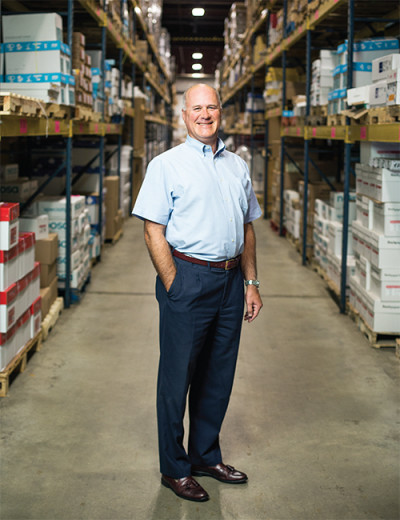
Dave Butler, MBA’91, president, Butler-Dearden
A Place for Ideas
Throughout his childhood and until his sophomore year in college, Dave Butler, MBA’91, dreamed of being an oceanographer. He majored in geology and participated in a summer program at Woods Hole, Massachusetts, where he helped collect research data on land and from a tall ship at sea. But this was 1983, before the era of personal computers, and Butler found the endless handwritten calculations tremendously boring. “I thought, ‘This is not what I want to do for the rest of my life,’” he says. When he returned to school that fall, he switched his major to economics, with a plan to go into business.
Business was a logical choice. His family had owned Butler-Dearden, a wholesale distributor headquartered in Boylston, Massachusetts, for four generations. From its beginnings in 1882 as a twine and packaging store, Butler-Dearden grew over the decades to offer janitorial supplies, office papers, packaging materials, and food service supplies. It sells everything from brooms to plastic forks to copy paper to packing tape. But Butler didn’t want to join the family business, at least not at first, so after graduation he went to work in sales at Xerox. Butler had worked there for two years when his father, George, came to him with an important question. George’s cousin and business partner was ill and wanted out of the business. “My father said to me, ‘If you want to come in, I’ll buy him out,’” Butler remembers. If his son wasn’t interested, George planned to sell the company.
Butler was just 23 years old but already sensed that he could have a bigger impact in a smaller organization. “I’d had enough of a taste of Xerox at that point to realize that I wasn’t crazy about working for a huge international company,” he says. He also was working toward his MBA at Babson at the time and brimmed with new ideas for Butler-Dearden on topics such as sales management and strategic planning. “The bulk of the research projects I did were about the company,” he recalls. And so Butler agreed to join the business.
At first he worked in sales and focused on building relationships with new customers throughout the region. Over time, his father asked him to take on bigger responsibilities, and he got the hands-on involvement that he had once craved at Xerox. “At a small company you can see results right away,” Butler says. “Let’s say something’s not going well. We can instantly change it. We don’t have numerous boards to go through or committees. Sometimes that’s good, sometimes it’s bad, but you don’t have a lot of meetings or wasted time.” The company makes its own rules, he adds. If customers ask for something new, the company can easily decide to give it a try.
He and his father worked side by side for roughly 20 years until 2005, when George handed the president’s role to his son. George continues to remain involved in the business as chairman of the board. “I think we work well together,” Butler says. “He was always more on the sales front and really great with customers. My skill set is more in the finance and operations arenas. Together we’re a good mix.”
When Butler joined the company 28 years ago, competition came from other small, independent companies. But shifts in market trends mean the company now competes with Internet-based businesses and big office supply stores such as Staples, which now also carries janitorial supplies and packaging materials. One strategy Butler employs to set his company apart is nurturing a strong sales team. “We don’t have a lot of turnover in the sales force, and the knowledge they’ve acquired on the products is substantial,” Butler says. His sales force strives to develop long-term relationships with clients and shows them how to use products to save time and money.
As with any business, knowing the customer is key, so Butler makes an effort to understand why his customers keep coming back. “They like consistency,” he says. “A lot of the bigger companies hire young kids in their first job. They’re there for a year, and then they’re gone.” At the same time, one of Butler-Dearden’s biggest challenges is attracting young employees, especially for sales. “Coming out of college, not a lot of kids say, ‘Hey, I want to sell toilet paper,’” says Butler. Young people rarely respond to the company’s job openings posted on websites like LinkedIn. So he and his team seek out potential employees by word of mouth, talking with vendors and sales reps to get leads on promising talent.
Butler believes young grads miss opportunities by passing up companies like his. “Salespeople can make a tremendous amount of money in this field,” he says. “Our people are on straight commission, but there’s no cap. The sky’s the limit. The majority of the sales reps here are doing very well for themselves.” Butler also believes that a sale is a sale, no matter what a person sells. “You still get the close,” he says, “and that rush of adrenaline.”
Erin O’Donnell is a freelance writer living in Milwaukee.
]]>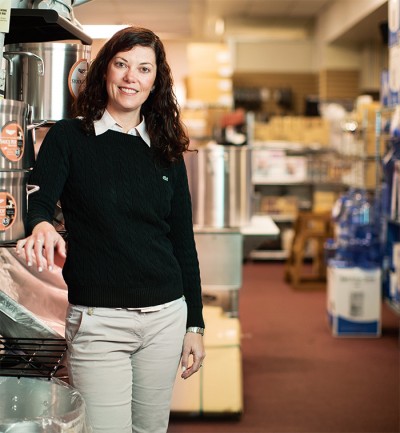
Photo: Tom Kates
Tricia Powers Dambrauskas, MBA’04
When Tricia Powers Dambrauskas, MBA’04, was in the second grade, her mother, Gloria, a veteran of the food-service industry, decided to start her own company. With support from her husband, Gloria founded B&G Restaurant Supply in Pittsfield, Mass., selling everything from ketchup bottles to industrial-grade stoves. “I remember them sitting me down and having a very serious conversation about how money might be tight,” says Dambrauskas. “I thought, oh no, does that mean I’m not going to get any toys for Christmas?”
Dambrauskas smiles at the memory and says she never noticed any difference in their lifestyle. “My parents didn’t live extravagant lives anyway,” she says. But the business was the start of a new life for the family. About a year after opening, it was doing so well that her father, Bernie, quit his job to help. Her older brother, Bob, in high school at the time, would work in the warehouse after classes, and Tricia would bring back pizza from a shop across the street to eat while her mother finished work. Soon after Bob graduated from high school, he joined the company full time. Once Dambrauskas was in high school, she worked summers at B&G, learning the ropes from her mother.
The company continued to grow, offering its services and products beyond restaurants to any business or institution with a commercial kitchen. When Dambrauskas graduated from high school in 1996, her family expected her to come on board, but she had other plans. Instead, she went to college and studied business, and then she took a job with Fidelity. “I think it was like that kid that plays the same sport their whole life. You just kind of want something different,” she says. Although disappointed, Dambrauskas’s family supported her and continued to include her in many business decisions. “I always felt connected,” she says.
In 2005, after earning her MBA and inspired by the entrepreneurial atmosphere at Babson, Dambrauskas decided to rejoin B&G, bringing with her a breadth of knowledge gained from her experiences. Initially, she helped with finances and human resources, starting a 401(k) for the company. Then she branched out to IT, setting up networks and databases. In 2006, she and her brother, today the company president, opened another operation in Albany, N.Y., called B&G Foodservice Equipment, which they own by themselves. “My dad was worried about whether it would be successful,” she says. But the siblings’ instincts were right; the location is thriving.
Nowadays Dambrauskas does “everything under the sun,” in part because she enjoys the diversity but also because both of her parents passed away not so long ago. To this day, Dambrauskas comes across stray tasks that her parents used to do that have fallen by the wayside. “They did so much,” she says. Despite the emotionally difficult times, the siblings have carried on, and both B&G locations are doing extremely well with record sales. Dambrauskas gives much of the credit to her parents. “They never hesitated to teach us, pass things on, and let us just take control and start making the decisions,” she says. “They made it easy for us to keep moving forward.”—Donna Coco
]]>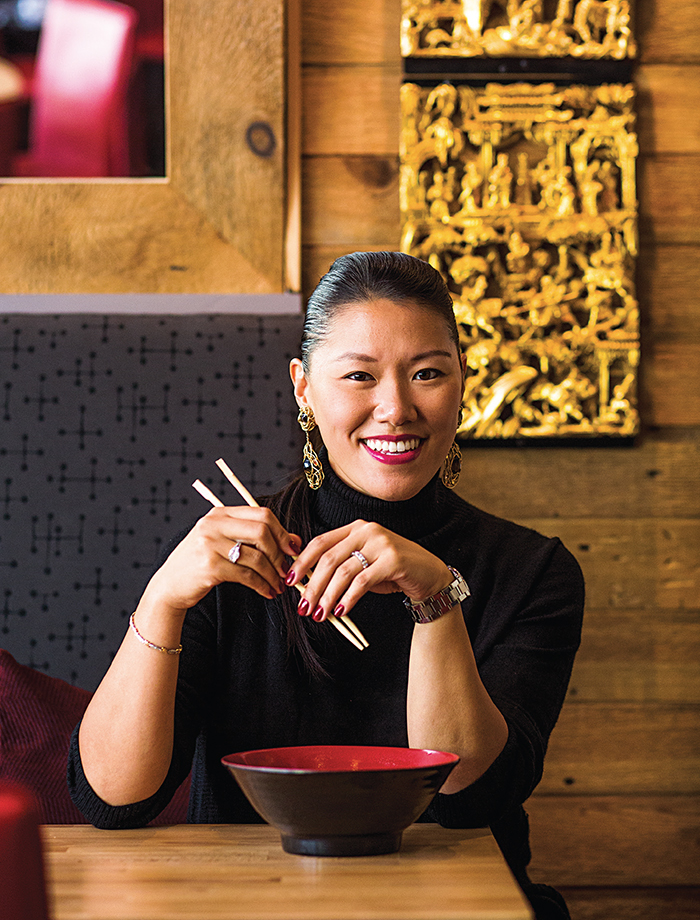
Photo: Pat Piasecki
“The food is number one,” says Nadia Liu Spellman ‘04, owner of Dumpling Daughter. “Your personal life is secondary.”
Nadia Liu Spellman ’04 still relishes the memory of the phone call.
On the line was Sheryl Julian, the grand dame of food at The Boston Globe. Julian was calling to check some facts for a pending review she was writing on Dumpling Daughter, the Chinese restaurant in Weston, Mass., that Spellman had opened last year.
The call caught Spellman by surprise. She was excited to talk with the food critic, though that quickly gave way to alarm. A review? What would it say? Her mind raced, but then Julian put her at ease. “I love, love, love, love, love your food,” Julian told her.
With those words, Spellman felt herself float. “She said it five times. I teared up. I was so overwhelmed with happiness,” says Spellman. “She is so well-respected. She made me feel legit. You feel like all your effort has been validated.” Searching for the perfect location, revising the menu, tinkering with operations, working day after day. All the restaurant demands of Spellman is everything: her time, her energy, her life. “There is very little sleep,” she says. “Even when I’m sleeping, I’m dreaming of what to do.”
But being recognized for that hard work was satisfying. On the wall of her restaurant, Spellman proudly displays Julian’s review: “Dumpling Daughter’s Chinese Food Is Exquisite.”
Celebrities and Lobster Rolls
To run a restaurant well, restaurateurs must master everything that goes into a guest’s visit. “It demands sensitivities to all the senses,” says Gherardo Guarducci ’88, P’17. “Taste buds, your vision. You have to be an expert in all things. Sound. How things look. How things feel. You are close to a movie director, or an artist of some sort. On top of all that you have to be a good businessman. A successful restaurateur is as close to being a Renaissance man as you’ll find in the business world.”
Guarducci ought to know. He is the principal owner of a fleet of fine-dining restaurants in New York City and Southampton, N.Y. His Regency Bar & Grill is the home of a power-dining scene at the Loews Regency Hotel. Italian food is the specialty at Felice, Sant Ambroeus, and Casa Lever, the latter of which attracts some well-known patrons, including former President Bill Clinton, whose visits require a security sweep in advance of his arrival. Some famous guests, notes Guarducci, have specific requests on how hidden or conspicuous they want their table. “It can be more out of the way, or more in the way,” he says. “It depends on the celebrity.” On the wall at Casa Lever hang about 30 Andy Warhols on loan from private collections. They’re worth close to $100 million.
In total, Guarducci’s restaurants have 11 locations. Their back-of-house operations, which are run out of a central office of 30 bookkeepers, managers, and marketers, is where Guarducci starts his days. Then for lunch and dinner he does a sweep of his restaurants. He eats in his establishments every day. “I have a tough time eating in other restaurants,” he admits. “The quality that my restaurants provide is the quality I want. I’m quite difficult to please.” Guarducci collaborates with his chefs on the menus, and he often hires chefs from Italy to invigorate the food offerings.
A common link among many alumni restaurant owners is that they grew up in families who value the importance of good food and eating together. Guarducci’s father was a busy man, an entrepreneur in the textile industry, but at mealtime the entire family, including Guarducci and his five siblings, sat down and ate together. The future restaurateur grew up in Tuscany in Italy, and his family ate the best of local produce, game, and catches from the sea. “It’s from the ground to your mouth, from the sea to your mouth, from the woods to your mouth,” he says. He credits his upbringing with helping him understand what good food should be.
Guarducci came to the U.S. to attend Babson, and in the early 1990s he began opening a string of upscale sandwich shops, seven in total, in Manhattan, Phoenix, and London. The shops offered Guarducci his first foray into the food industry and served as a gateway to the more fancy restaurants he started opening about 10 years ago. Having now made a career in the industry, Guarducci calls restaurants an “honest business.” Restaurateurs can’t fake good food or service, he says, noting the high failure rate of new restaurants. “It is an honest business in judging you quickly,” he says. “You won’t survive unless you’re good.”
Paul Barker, MBA’94, owns Pauli’s, a Boston sandwich, wrap, and pasta restaurant that he opened in 2011. He cautions those who fantasize about opening a cafe. “People have these dreams,” he says, “but they don’t research it enough. It’s not something you just walk into. You need to have some experience, and you need to be passionate about it.” Barker also points to the substantial initial investment required to open an eatery. “There are businesses you can start out of a basement and have a great potential for growth,” he says. A restaurant isn’t one of them.
Barker grew up in the food business. His grandfather, father, and uncle all owned grocery stores in Boston’s North End. His mother also opened a restaurant, Nicole’s, in the historic Italian neighborhood. Barker’s grandfather taught him how to count money as a little boy, and, as Barker grew older, he rang up customers and waited on those needing meats, olives, and cheeses. “It’s something you grow up in,” Barker says. “You become familiar with how to operate a business. It’s almost like a family internship.”
Barker enjoyed working with food, but he saw the downside as well, how his family worked weekends and long days. “When I was younger, I said I would never go into the food business,” he says. For 10 years, Barker worked in sales but then realized he didn’t want to spend his life climbing the corporate ladder. Gravitating back to food, he first opened an Italian fast-food eatery in Hanover, Mass., and then a sandwich and catering business in Boston’s Financial District. Both proved successful before he eventually sold them. After working as a consultant in the food industry for a stretch, Barker opened Pauli’s, known for its lobster rolls and creative, gut-busting sandwiches.
Before Barker launched each of his food ventures, his mother sat him down for a talk. She gave him her full support, telling him she wasn’t worried that the businesses would be unsuccessful. Still, she had one concern. “She’d ask me if I really considered all the time commitments,” he says. “She was worried if I would have personal time, family time.”
Barker hadn’t forgotten the long days his parents used to work. Now a father with children ages 10 and 14, he has hired trusted managers to run Pauli’s in his absence. He only stays late to close shop two nights a week, giving him time to help with homework and coach his children’s sports teams. “I am very involved with their lives,” he says.
99 Percent Confidence

Photo: Pat Piasecki
Dumpling Daughter
Dumpling Daughter’s Spellman also grew up in the food business. In the 1980s, her parents opened Sally Ling’s. Named for Spellman’s mother, it became the first fine-dining Chinese restaurant in Boston. Many a Chinese New Year and family celebration were held there, though Spellman was happiest eating her mom’s cooking at home with her family. Many of those meals, including dumplings, buns, and her grandmother’s meat sauce over spaghetti—what Spellman calls her “comfort food”—form the heart of Dumpling Daughter’s menu, as do a few Sally Ling favorites such as cucumber salad and wonton soup. “It’s a very personal menu,” Spellman says.
Years passed before Spellman actually opened her own restaurant. The first obstacle was her parents. “They didn’t want me to do it,” Spellman says. “They said, ‘It’s really tough. Don’t feel like you have to follow in our footsteps.’” So after graduating from Babson, Spellman moved to New York and took a job in finance. She used her paychecks to eat out in the city as often as she could; reading The New York Times food section, she searched for the best burger, the best seafood, the best service, the best of whatever she could find. And on the nights she didn’t eat out, she hosted dinner parties, attended potlucks, and experimented in the kitchen.

Photo: Pat Piasecki
Dumpling Daughter
Spellman ultimately realized that she couldn’t escape food as a career. “I just love food,” she says. “I just love the business.” In 2008, she began working on weekends at Sally Ling’s, which her mom had relocated to Fort Lee, N.J., and the following year she quit her job in finance. At Sally Ling’s, she learned everything about running a restaurant. By 2010, Spellman moved back to the Boston area, feeling ready to open her own place.
Now the hard work began. Spellman spent a year fine-tuning a business plan and the menu, which went through more than 20 iterations. To simplify operations, she decided against offering full service or a bar. As for a location, the exhaustive search focused first on high-traffic areas. Spaces were hard to find due to slow turnover, but Spellman finally landed a potential location in Cambridge’s Kendall Square. To satisfy the demanding landlord, she spent $20,000 in fees for an attorney, architect, and engineer as she prepared to sign the 50-page lease, which would be for 10 years. The build-out of the site would cost $750,000.

Photo: Pat Piasecki
Dumpling Daughter
The day before she was set to sign, Spellman and her mother took a last look at the space. “Are you more than 50 percent afraid to sign the lease?” her mom asked. “You need to be more than 50 percent excited and comfortable, not scared.” Spellman had her doubts. She wasn’t sure if she could sell enough food there to pay her expenses. “I’m about 80 percent scared,” she replied. Her mother told her to pull out. “You lost $20,000,” she said, “but it could have been $750,000.”
Spellman grew frustrated. “Do I really want to do this?” she thought. Then she came across a spot in quiet Weston, her old hometown. A former pizza place, the space was located across the street from where Spellman first met her husband in the seventh grade, and only about a mile from where she ate those great meals in her childhood home. It felt right. She called the landlord, and after a couple of quick conversations, a lease was drawn. Three years after the search for a location began, Dumpling Daughter had a home. “When I signed the lease, there was 99 percent confidence,” Spellman says. “Now I know what my mom was talking about.”
Bikes in the Back
Once they open their doors, restaurant owners must make sure customers actually walk through them. Countless eateries exist. Why should anyone go to theirs? “You have to be different,” says Barker of Pauli’s. “You need to figure out what your identity is going to be. You have to differentiate yourself.”
Pauli’s held an Easter egg hunt in the North End this year, and delivery drivers use electric bicycles and wear helmets with the restaurant’s logo. For May the Fourth Be with You, a day celebrating Star Wars, Pauli’s offered the Yoda Wrap, Ham Solo, and Obi-Wan Grilled Cheese. “We’re always doing crazy things,” Barker says. “People know when they come in they’re in for a surprise.”
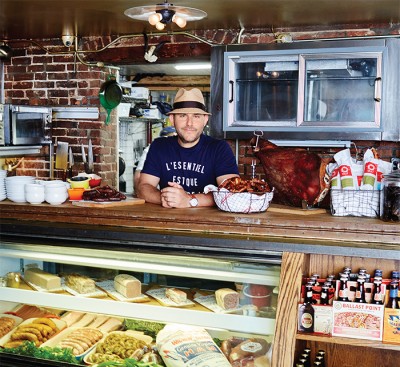
Photo: Winnie Au
Christian Pappanicholas ’98 owns The Cannibal Beer & Butcher (above) and Resto, a Belgian bistro.
The Cannibal Beer & Butcher, owned by Christian Pappanicholas ’98, offers its own take on unique. The New York eatery is part butcher shop, part charcuterie-focused restaurant with some 450 beers from around the world, and part bike shop with tires, water bottles, and other essential bicycling gear for sale. Pappanicholas is a cycling fan, and he named the restaurant after the moniker of biking legend Eddy Merckx. Pappanicholas says the restaurant is a bike-friendly place, where bicyclists can go after a ride to grab a beer and a bite. Bikes can be stored in the racks located in back of the restaurant, where customers also will find a garden seating area. For those wearing their biking gear, the beer is buy one, get one free.
Pappanicholas loves to watch patrons carrying their rides through the restaurant. “It creates a conversation,” he says. “It makes it fun.” Cycling events are often on the TV, and The Cannibal even sponsors a cycling team of 60 riders. All these efforts have created a loyal clientele. “It’s a brilliant community of people,” says Pappanicholas.
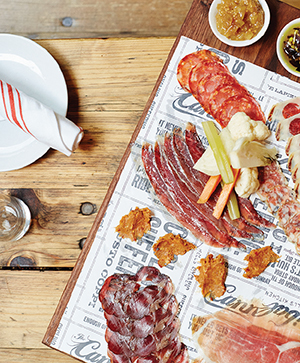
Photo: Winnie Au
The Cannibal
Like others, Pappanicholas grew up in the food industry. His father was co-owner of a pair of Greek restaurants, first the Ivy Stone and later T’Adelphia, in Newark, Del. He remembers sitting on a milk crate and wrapping potatoes in tinfoil with his cousin, Nick. Pappanicholas was 6 or 7 at the time, and for every box of potatoes he went through, he received a dollar. “That was one of my first memories,” he says. Through the years, he performed every job from busboy and dishwasher to line cook and manager “It was a family business,” he says. “We pitched in as much as we could.”
After graduating from Babson, he worked at a real estate firm for five years, but not sure what the future held there, he turned back to food. He attended The French Culinary Institute (now the International Culinary Center) and took a series of jobs managing restaurants before opening Resto, a Belgian bistro, in 2007. The Cannibal followed in 2011, and it now has a satellite location in a Manhattan market. Another Cannibal location in Culver City, Calif., is set to open this fall.
As a veteran restaurateur, Pappanicholas enjoys the reciprocity that happens among restaurant owners. If they need a plumber or a better pig, they call each other. If an employee isn’t quite clicking, they may send him or her to an eatery that’s a better fit. And with millions of people streaming into New York City every day, they don’t fight over customers. They recommend each other’s restaurants. “You come to New York, you don’t go to Zagat’s,” Pappanicholas says. “You come to me. I’ll tell you where to go. I’ll make the reservations for you.”
Good as the Last Plate
Once a restaurant is up and running, consistency becomes key. “It goes live every day,” says Casa Lever’s Guarducci. “It is very comparable to a theater show. Every day, you have to perform.” That means that everyone on the team must be kept motivated. “A bad waiter can make a great dish forgettable,” Guarducci says. “You can only grow if you surround yourself with people who are inspired.”
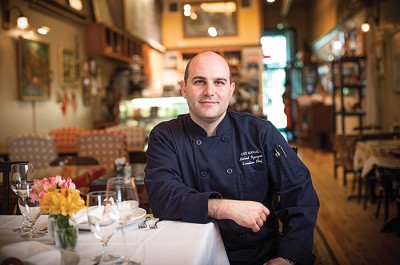
Photo: Tom Kates
“Cafe Mangal is a true family business,” says co-owner and executive chef Mehmet Ozargun ‘02, “and we have put so much hard work into it as a family.”
At Wellesley’s Cafe Mangal, a Mediterranean restaurant with an emphasis on Turkish cuisine, co-owner and executive chef Mehmet Ozargun ’02 has a number of employees who have worked with him for years. Every Saturday night after the restaurant closes, he cooks dinner for all the employees to show his appreciation. “It’s pretty late at night,” he says. “We chat and eat.”
The core staff of the restaurant is a constant. Ozargun oversees everything related to the kitchen, while his father, Omer, handles bookkeeping. His mother, Berna, and long-time manager Gul Bahceci run the front of the house. Bahceci has worked alongside the Ozarguns for 14 years. “She is like a family member,” Ozargun says. “She is like my parent’s daughter.” Ozargun’s brother, Evren ’99, isn’t involved in the day-to-day operations, but he acts as an outside consultant, chiming in on big decisions and dining at the restaurant to offer feedback. Together, the core staff members keep the cafe humming. “I respect their opinions,” Ozargun says. “I learn from their wisdom.”
Originally from Istanbul, Ozargun and his family moved to the U.S. in 1998 and immediately began investigating possible business opportunities. They pondered opening a rug store or a gift shop but settled on a coffee and tea house, following in the footsteps of Ozargun’s great-great-grandfather in the late 1800s. “He used to own the most famous pastry shop in the heart of Istanbul,” Ozargun says. “I guess it is in our genes.”

Photo: Tom Kates
Cafe Mangal specializes in Turkish food, a cuisine that is not well-represented in the U.S., says Mehmet Ozargun.
Cafe Mangal opened in 2000 when Ozargun was a sophomore at Babson, and, every day for lunch, he came over from campus to help out. During summer vacations, he traveled to Istanbul to work in the city’s restaurants. He also took cooking lessons and later went to Johnson & Wales University for restaurant management.
Through the years, Cafe Mangal has transitioned. When it opened, the restaurant served breakfast and only a light lunch. Today, it serves a full lunch and then closes for a spell, as candles are brought out and white linen replaces the Turkish head-scarves that serve as lunchtime tablecloths so the restaurant can reopen for fine dining at dinner. Ranked by Zagat as the seventh-best restaurant in the Boston area, Cafe Mangal serves contemporary and traditional menu items, though some concessions are made for American palates. At lunch, for instance, the garlic is toned down for people heading back to work.
Despite the restaurant’s success, Ozargun and the staff don’t stand still. “It’s the food business,” he says. “You’re only as good as your last plate.” They might change the menu or paint the walls a new color, and Ozargun visits other restaurants for ideas, checking out not only the food but also such details as glassware, music, and even the bathrooms.
As with all the alumni restaurateurs, Ozargun finds the cafe a commitment that never ends. “We put so much hard work into the restaurant and have sacrificed a lot during the last 15 years,” he says. “It is literally our second home.” At the end of a long day, he might go into the dining room, where paintings and family pictures hang on the wall, and talk to customers, many of whom are regulars. “Sometimes you’re so tired at the end of the day,” he says. “But then I talk to customers. That takes everything away.”
]]>